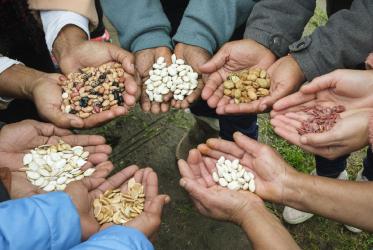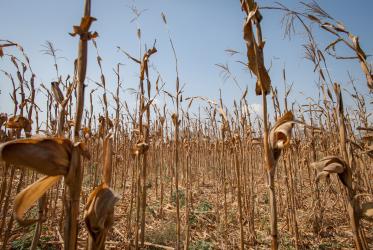October 16 is the World Food Day, and from October 15 to October 21, we celebrate the Churches' Week of Action on Food. So it is an appropriate time to reflect on the scandal and the shame that each night, one person in nine of all humanity goes to sleep hungry. 38 million more people than the previous year are hungry, bringing the number up to 815 million, reversing the 10-year trend of gradual reduction in hunger.
Looking closer, one in three of all people in the world are malnourished, with under-nutrition or obesity in both children and adults increasing simultaneously. Sixty percent of undernourished people are women or girls. Latest evidence also points that one in five deaths today is diet related.
Why is this so, when the world produces enough food for all? When there is enough knowledge about healthy diets and life style?
There are four key reasons for this sorry state of affairs:
- Conflicts: 60% of the hungry people in the world live in regions affected by conflicts caused by man. Violent conflicts, war, flagrant abuse of human rights, denial of civil and political rights, insecurity and displacement precipitate hunger. In spite of many efforts, including faith communities trying hard to help, food too is used as a weapon of war. The lack of political will to make peace and the poor response – with only half the people affected being reached and only half the resources needed being raised –contributes to this catastrophic situation.
- Commodification of food and industrial agriculture: The industrial food chain is using at least 75% of the world’s agricultural land and most of agriculture’s fossil fuel and freshwater resources to feed barely 30% of the world’s population. Conversely, more than 500 million small farmers around the world are using less than 25% of the land and comparatively negligible fossil fuels or chemicals to feed 70% of humanity.
- Climate change: The short term impact of climate change results in frequent and more intense extreme weather events, and the long-term impacts are caused by changing temperatures and precipitation patterns. Climate change affects human health, livelihoods, food production and distribution channels, as well as changing purchasing power and market flows.
- Patriarchy: The status of women and their access to education, land and resources have a profound influence on society. There is a strong correlation between hunger and gender inequalities. Women's limited control over assets limits their capacity in food production as well. Twice as many women suffer from malnutrition as men, and girls are twice as likely to die from malnutrition as boys. Maternal health is crucial for child survival - an undernourished mother is more likely to deliver an infant with low birth weight, significantly increasing its risk of dying. Land ownership and improved access to decision making, education and resources for women are the best guarantee to assure food on the family’s table and to assure the health and welfare of future generations.
Mend our broken relationships.
As Athena Peralta reflects in her biblical reflections in the upcoming newsletter of the Food for Life Campaign, food is about our relationship with the God of Life, creator and provider, who lovingly and abundantly endowed the Earth with fertile fields for human beings to till, forests to forage, rivers and ocean to fish in so that none may go hungry and all may live in full (John 10: 10).
Food is also about our relationship with land, water and air, the very sources of our sustenance. Finally, food is about relationships between and among peoples. It is our existential need and our moral and ethical imperative that we strive to bring healing and reconciliation to broken relationships and invest in strengthening our relationships with God, each other and the environment, if we are to end hunger.







